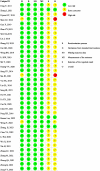Efficacy of acupuncture therapy on cancer-related insomnia: a systematic review and network meta-analysis
- PMID: 38414556
- PMCID: PMC10896907
- DOI: 10.3389/fneur.2024.1342383
Efficacy of acupuncture therapy on cancer-related insomnia: a systematic review and network meta-analysis
Abstract
Objectives: Cancer-related insomnia (CRI) takes a toll on many cancer survivors, causing distressing symptoms and deteriorating the quality of life. Acupuncture therapy has been used for CRI already. However, it is still uncertain which acupuncture regime is best for CRI. The primary objective of this review is to conduct a comparative evaluation and ranking of the effectiveness of different acupuncture therapies for CRI.
Methods: Randomized controlled trials (RCTs) that were published up to July 31, 2023, from 8 databases (PubMed, Embase, Cochrane library, Web of Science, China National Knowledge Infrastructure, Wanfang Database, VIP Database, and China Biology Medicine disc) were integrated in this study. Trials that met the inclusion criteria were evaluated the risk of bias. Pittsburgh sleep quality index (PSQI) was used to assess the efficacy of different acupuncture therapies as the primary outcome. Then, STATA 15, R, and OpenBUGS were applied to perform the network meta-analysis. PRISMA statements were followed in this network meta-analysis.
Results: A total of 37 studies were included in this review, involving 16 interventions with 3,246 CRI participants. Auriculotherapy + moxibustion [surface under the cumulative ranking curve (SUCRA) 98.98%] and auriculotherapy (SUCRA 77.47%) came out top of the ranking, which were more effective than control, medicine, usual care and sham acupuncture.
Conclusion: Auriculotherapy + moxibustion and auriculotherapy + acupuncture emerged as the top two acupuncture regimes for CRI and future studies should pay more attention to CRI.
Clinical trial registration: https://clinicaltrials.gov/, identifier INPLASY202210095.
Keywords: acupuncture therapy; cancer-related insomnia; network meta-analysis; non-pharmacological therapy; the complication of cancer.
Copyright © 2024 Chen, Li, Xu, Liu, Jiao and Zhou.
Conflict of interest statement
The authors declare that the research was conducted in the absence of any commercial or financial relationships that could be construed as a potential conflict of interest.
Figures






References
Publication types
LinkOut - more resources
Full Text Sources
Miscellaneous

